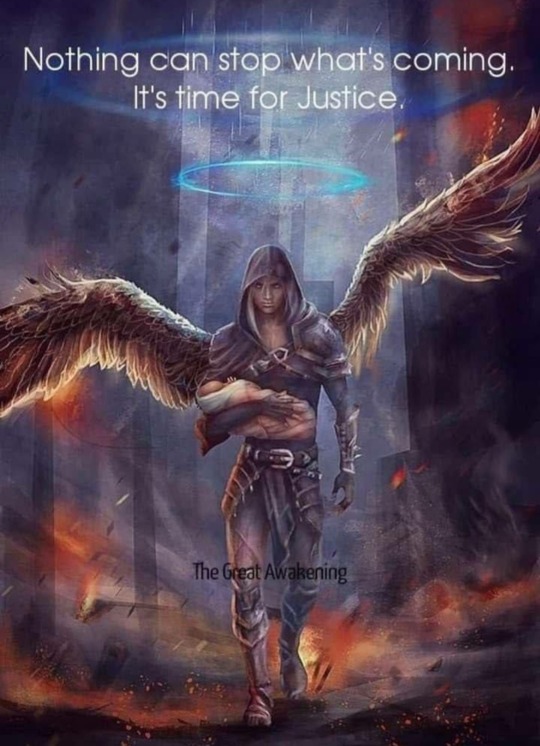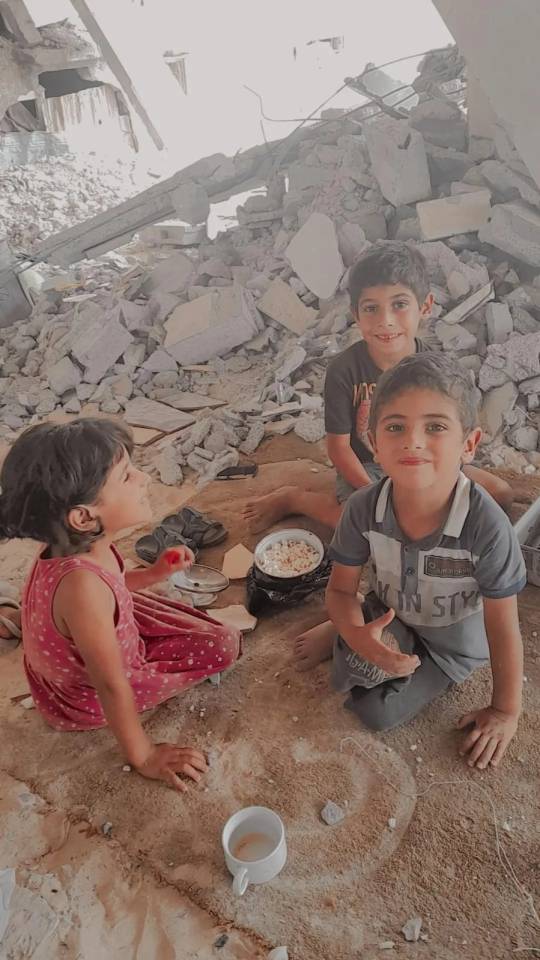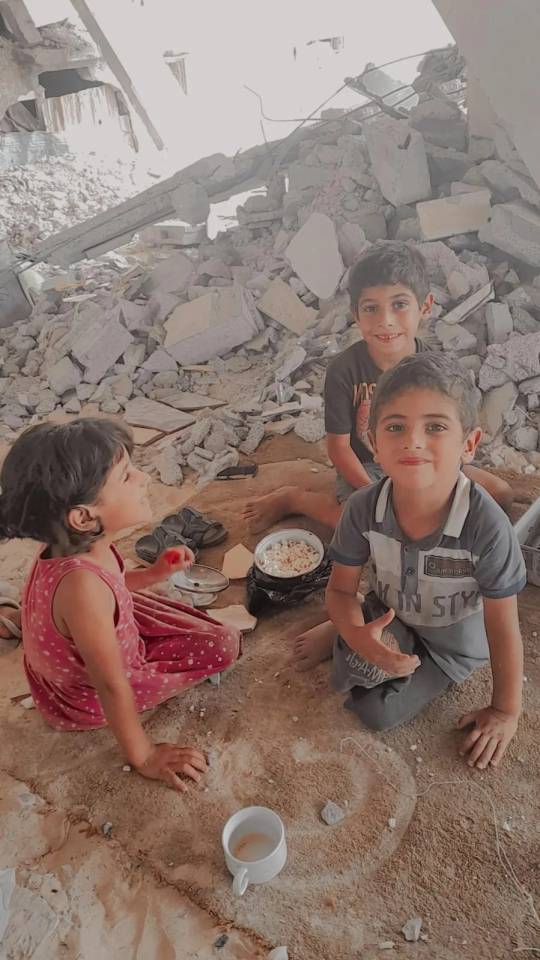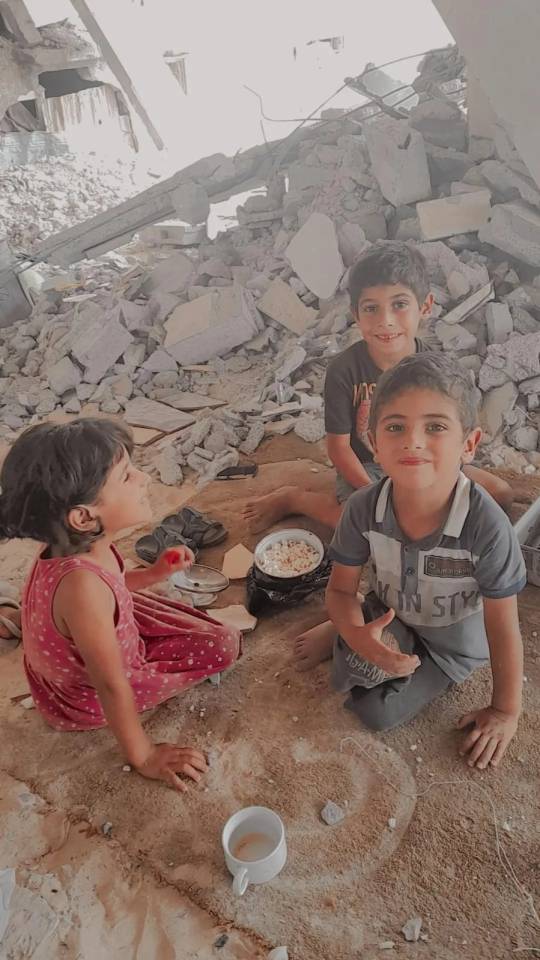#hamash
Explore tagged Tumblr posts
Text
*Difundelo en todos los idiomas del mundo... si apoyas la resistencia...*
*Las calumnias del Fiscal Penal Internacional contra Hamás...*
1- Equiparó la verdad con la falsedad y equiparó a la víctima con el verdugo
2- Adoptó la narrativa israelí sobre los acontecimientos del 7 de octubre, que el estado ocupante no pudo probar, y su narrativa fue refutada por la prensa internacional debido a la falta de pruebas...
3- Habló sin justicia. Visitó el estado ocupante y no visitó Gaza.
4- Acusar a Hamás de actos atroces como la violación y el asesinato de niños y mujeres. Todo el mundo sabe que Hamás es islámico y que en la religión islámica no está permitido llevar a cabo estos actos. Tratar con prisioneros es la mejor prueba.
5- Dijo que no está permitido tomar como rehenes a civiles. Se sabe que todo el que reside en el estado de la entidad es soldado y no hay un solo civil que haya servido en el ejército y porte armas. dejar a los niños sin sus madres que sirvieron en el ejército de ocupación.
6- No habló de las causas de los hechos del 7 de octubre.
7- No habló de los miles de prisioneros palestinos en las cárceles israelíes y de sus torturas.
8- No habló de los crímenes de la ocupación en Jerusalén, asesinatos y abusos.
9- No habló del asedio a Gaza durante 17 años sin salir de la Franja de Gaza
10- No habló de las masacres, incluido el asesinato de niños y mujeres, la mutilación de cuerpos de civiles y el robo de algunos de ellos.
12- No habló de la destrucción de Gaza para que ya no fuera apta para la vida normal y las necesidades para la vida ya no existieran allí.
13- No habló de asentamientos, confiscación de tierras palestinas y destrucción de sus hogares en Cisjordania.
14- No habló sobre el uso por parte del ejército de ocupación de armas internacionalmente prohibidas.
15. No habló de que Estados Unidos, Gran Bretaña, Francia y Alemania suministraran armas al ejército de ocupación para matar palestinos.
16- No habló de la destrucción de hospitales, escuelas, universidades, mezquitas, iglesias y centros de la UNRWA.
17- No habló del asesinato de médicos, periodistas y misiones internacionales de ayuda y alimentación.
18- No habló de impedir que Israel entre en la prensa internacional para documentar lo que pasó y está pasando
19- No fue justo cuando equiparó un ejército fuertemente armado con aviones, tanques e infantería a cambio de una resistencia con armas primitivas.
20- No dijo que el estado ocupante se basa en una ocupación ilegal, que Gaza está ocupada y que el ocupante es responsable de sus crímenes.
21- Más bien se olvidó de la ley de las Naciones Unidas y no estuvo de acuerdo con ella en que la resistencia es dentro de un país ocupado y que las leyes no lo impiden.
22- Emitió memorandos a dirigentes de Hamás sin sustento legal y sin refutar los artículos legales que así lo permiten.
23- La conferencia del Fiscal General está sesgada hacia Israel y contiene el aliento de la administración estadounidense y las amenazas del Congreso de los Estados Unidos a las que respondió
24- El Fiscal se centró únicamente en el asedio y el hambre y no mencionó la matanza de niños y mujeres, el abuso de civiles y la destrucción que se produjo en Gaza.
25- Lo único que quiere el fiscal es insultar a los palestinos y a Hamas para distorsionar la resistencia frente a sus partidarios en la calle internacional occidental, las universidades y los liberales...
26 - Exigió la emisión de una orden de arresto para dos miembros del gobierno de ocupación y tres líderes de Hamás... ¿Qué tan gracioso es eso? ¿Por qué no exigió a todos los miembros del gobierno de ocupación y a los líderes del ejército que exigieron la eliminación de Gaza? la Tierra, y algunos de ellos exigieron el lanzamiento de una bomba nuclear?
¿Es esta justicia... o la justicia del falso sionismo que controla todas las instalaciones de las Naciones Unidas...?


2 notes
·
View notes
Text

Anthony Fineran (B 1981), Goong Hamash, 2023
0 notes
Text
🔻 🚨 🔻
Sarah from Gaza🍉, a mother of three children: Youssef, Sham, and Ahmed.
My home used to be a safe haven for my children, but now only rubble remains😥. The army forced us to flee under relentless bombing😭, and all I could do was hold my children close💔. Youssef suffered a broken arm from the shrapnel, and we had to do surgery in the middle of this terror. The twins, Sham and Ahmed, should be playing, learning, and dreaming… but the war stole their childhood.
Today, we have no food, no water, and no safety. Prices are skyrocketing, and we have no income or any assistance. My children are terrified all day by the sound of the missiles and explosions.
All I’m asking for today is a moment of empathy:
💸 Even a small donation can bring a smile back to my children’s faces.
🔁 Or just sharing this post, maybe it will reach someone who can help.
Every bit of support makes a huge difference🙏🥺, even if it’s small. Please, help me protect my children from hunger, cold, and the bombings.
With love and hope in all of you,
Sarah and her children.
🔻🔻

#gazaunderattack#gaza strip#gaza genocide#free gaza#gaza#all eyes on palestine#palestine fundraiser#i stand with palestine#save palestine#free palestine
1K notes
·
View notes
Text
Sarah from Gaza🍉, a mother of three children: Youssef, Sham, and Ahmed.
My home used to be a safe haven for my children, but now only rubble remains😥. The army forced us to flee under relentless bombing😭, and all I could do was hold my children close💔. Youssef suffered a broken arm from the shrapnel, and we had to do surgery in the middle of this terror. The twins, Sham and Ahmed, should be playing, learning, and dreaming… but the war stole their childhood.
Today, we have no food, no water, and no safety. Prices are skyrocketing, and we have no income or any assistance. My children are terrified all day by the sound of the missiles and explosions.
All I’m asking for today is a moment of empathy:
💸 Even a small donation can bring a smile back to my children’s faces.
🔁 Or just sharing this post, maybe it will reach someone who can help.
Every bit of support makes a huge difference🙏🥺, even if it’s small. Please, help me protect my children from hunger, cold, and the bombings.
With love and hope in all of you,
Sarah and her children.

405 notes
·
View notes
Text
Sarah from Gaza🍉, a mother of three children: Youssef, Sham, and Ahmed.
My home used to be a safe haven for my children, but now only rubble remains😥. The army forced us to flee under relentless bombing😭, and all I could do was hold my children close💔. Youssef suffered a broken arm from the shrapnel, and we had to do surgery in the middle of this terror. The twins, Sham and Ahmed, should be playing, learning, and dreaming… but the war stole their childhood.
Today, we have no food, no water, and no safety. Prices are skyrocketing, and we have no income or any assistance. My children are terrified all day by the sound of the missiles and explosions.
There is no safe place left, and we can’t even afford a tent to sleep in.
All I’m asking for today is a moment of empathy:
💸 Even a small donation can bring a smile back to my children’s faces.
🔁 Or just sharing this post, maybe it will reach someone who can help.
Every bit of support makes a huge difference🙏🥺, even if it’s small. Please, help me protect my children from hunger, cold, and the bombings.
With love and hope in all of you,
Sarah and her children.

38 notes
·
View notes
Text

Sarah from Gaza🍉, a mother of three children: Youssef, Sham, and Ahmed.
My home used to be a safe haven for my children, but now only rubble remains😥. The army forced us to flee under relentless bombing😭, and all I could do was hold my children close💔. Youssef suffered a broken arm from the shrapnel, and we had to do surgery in the middle of this terror. The twins, Sham and Ahmed, should be playing, learning, and dreaming… but the war stole their childhood.
Today, we have no food, no water, and no safety. Prices are skyrocketing, and we have no income or any assistance. My children are terrified all day by the sound of the missiles and explosions.
There is no safe place left, and we can’t even afford a tent to sleep in.
All I’m asking for today is a moment of empathy:
💸 Even a small donation can bring a smile back to my children’s faces.
🔁 Or just sharing this post, maybe it will reach someone who can help.
Every bit of support makes a huge difference🙏🥺, even if it’s small. Please, help me protect my children from hunger, cold, and the bombings.
With love and hope in all of you,
Sarah and her children.
39 notes
·
View notes
Text
Sarah from Gaza🍉, a mother of three children: Youssef, Sham, and Ahmed.
My home used to be a safe haven for my children, but now only rubble remains😥. The army forced us to flee under relentless bombing😭, and all I could do was hold my children close💔. Youssef suffered a broken arm from the shrapnel, and we had to do surgery in the middle of this terror. The twins, Sham and Ahmed, should be playing, learning, and dreaming… but the war stole their childhood.
Today, we have no food, no water, and no safety. Prices are skyrocketing, and we have no income or any assistance. My children are terrified all day by the sound of the missiles and explosions.
There is no safe place left, and we can’t even afford a tent to sleep in.
All I’m asking for today is a moment of empathy:
💸 Even a small donation can bring a smile back to my children’s faces.
🔁 Or just sharing this post, maybe it will reach someone who can help.
Every bit of support makes a huge difference🙏🥺, even if it’s small. Please, help me protect my children from hunger, cold, and the bombings.
With love and hope in all of you,
Sarah and her children.

25 notes
·
View notes
Text
** URGENT 📢 **
🇵🇸 🇵🇸 🇵🇸 🇵🇸 🇵🇸 🇵🇸 🇵🇸 🇵🇸
- - - - - - - - - - - - - - - - - - -
Please help Mohammad and his family reach security and help them live a better life!! Reblogs are appreciated. 🩷
- - - - - - - - - - - - - - - - - - -

#free palestine#gaza#free gaza#palestine#gaza strip#gaza genocide#gaza gofundme#go fund them#go fund him#palestine go fund me#the gaza strip#gazaunderattack#vetted gofundme#palestine gofundme#go fund her#fundraiser#palestine fundraiser#please donate if you can#donate if you can#donations#genocide#mutual aid#aid for gaza#gaza aid#from the river to the sea 🇵🇸#freepalastine🇵🇸#free palestine 🇵🇸#from the river to the sea palestine will be free#gaza palestine free gaza help doante#send help
22 notes
·
View notes
Note
Hi 👋
A Cry for Help from Gaza
I am Sarah from Gaza 💔.. We have no food or water, not even a piece of bread 🍞.. My children are starving and crying from hunger 🥺😭..
The crossings are closed, the markets are empty, and the soaring prices have left us helpless and unable to secure a simple meal 🍽️💔.
The bombings never stop, and the army is forcing us to flee under a rain of missiles and bombs 🔥💣..
We have no tent, no shelter, no safety.. Only our broken hearts and our hopes clinging to God’s mercy 🤲🏻💔.
Please.. With a small donation or even by sharing this post, you could save my children from dying of hunger 🥺🙏🏻.
#gaza#palestine#free gaza#gaza fundraiser#gaza strip#gaza genocide#free palestine#fundraising#gazaunderattack#fundrasier#palistine#viva palestina#palestinian#palestine news#save palestine#i stand with palestine#gaza news#gaza solidarity#fundraiser#palestine fundraiser#go fund them#fundriser#mutual funds#crisis
21 notes
·
View notes
Note
Hi 👋
My name is Mohammed, a father of five from Gaza🍉. We have no food😥, no water, no money🙏—nothing to keep my children alive. The ongoing war has destroyed everything💔. There are no open markets, no open crossings, no hope. Starvation is spreading, and the sound of bombs never stops🥺. Now the army has forced us to evacuate under heavy bombardment. We left our home with nothing, no safety, no future. I write this with a heavy heart, pleading to anyone with compassion—please help 😭us survive. Please save my children from dying of hunger and despair🍉😭💔."
#leve palestina#needs boosting and donations#free palestine#free gaza#gaza#gaza aid#palestine#palestine aid#gaza genocide#gaza strip
21 notes
·
View notes
Text
Sarah from Gaza🍉, a mother of three children: Youssef, Sham, and Ahmed.
My home used to be a safe haven for my children, but now only rubble remains😥. The army forced us to flee under relentless bombing😭, and all I could do was hold my children close💔. Youssef suffered a broken arm from the shrapnel, and we had to do surgery in the middle of this terror. The twins, Sham and Ahmed, should be playing, learning, and dreaming… but the war stole their childhood.
Today, we have no food, no water, and no safety. Prices are skyrocketing, and we have no income or any assistance. My children are terrified all day by the sound of the missiles and explosions.
There is no safe place left, and we can’t even afford a tent to sleep in.
All I’m asking for today is a moment of empathy:
💸 Even a small donation can bring a smile back to my children’s faces.
🔁 Or just sharing this post, maybe it will reach someone who can help.
Every bit of support makes a huge difference🙏🥺, even if it’s small. Please, help me protect my children from hunger, cold, and the bombings.
With love and hope in all of you,
Sarah and her children.

11 notes
·
View notes
Text
Boycott!

Now that I have your attention:
So close...

#gravity falls#palestina#israel#gaza#free gaza#palestine#israel is a terrorist state#cartoonist#free palestine#cartoon#billford#the book of bill#gus porter#hunter#toh hunter#hunter wittebane#hunter clawthorne#hunter deamonne#hunter golden guard#hunter noceda#the owl house#save the children#save family#donate#donate if you can#please donate#donations#gofundme#fundraiser#signal boost
22 notes
·
View notes
Text
🚨 Urgent Humanitarian Appeal from Gaza 🚨
I'm Sarah from Gaza, writing to you with a heart full of fear and sorrow 💔. We're living a nightmare — no food, no water, the borders are closed, markets are empty, prices are skyrocketing🔥, and famine is spreading. We have no money to feed our hungry children 😔🥺.
We've been forcibly displaced under brutal and relentless bombardment 💣😢. We have no tent, no shelter, and no way to flee to a safer place, if one even exists. All we need is a simple tent and transportation costs, totaling just $600 ⛺🚗.
🤲 Please, I beg you, help me save my family. A small donation — or even just sharing this post — could be the reason we survive this tragedy 💔.
Every second that passes brings more suffering... please don't leave us alone 🙏💔.

🚨Sarah from Gaza🍉, a mother of three children: Youssef, Sham, and Ahmed.
My home used to be a safe haven for my children, but now only rubble remains😥. The army forced us to flee under relentless bombing😭, and all I could do was hold my children close💔. Youssef suffered a broken arm from the shrapnel, and we had to do surgery in the middle of this terror. The twins, Sham and Ahmed, should be playing, learning, and dreaming… but the war stole their childhood.
Today, we have no food, no water, and no safety. Prices are skyrocketing, and we have no income or any assistance. My children are terrified all day by the sound of the missiles and explosions.
There is no safe place left, and we can’t even afford a tent to sleep in.
All I’m asking for today is a moment of empathy:
💸 Even a small donation can bring a smile back to my children’s faces.
🔁 Or just sharing this post, maybe it will reach someone who can help.
Every bit of support makes a huge difference🙏🥺, even if it’s small. Please, help me protect my children from hunger, cold, and the bombings.
With love and hope in all of you,
Sarah and her children.

#gaza#free gaza#gaza genocide#gaza strip#gazaunderattack#free palestine#save palestine#i stand with palestine#palestine fundraiser#all eyes on palestine
723 notes
·
View notes
Note
Hi 👋👋
My name is Mohammed, a father of five from Gaza🍉. We have no food😥, no water, no money🙏—nothing to keep my children alive. The ongoing war has destroyed everything💔. There are no open markets, no open crossings, no hope. Starvation is spreading, and the sound of bombs never stops🥺. Now the army has forced us to evacuate under heavy bombardment. We left our home with nothing, no safety, no future. I write this with a heavy heart, pleading to anyone with compassion—please help 😭us survive. Please save my children from dying of hunger and despair🍉😭💔."
Donate and share asap
3 notes
·
View notes
Text
Sarah from Gaza🍉, a mother of three children: Youssef, Sham, and Ahmed.
My home used to be a safe haven for my children, but now only rubble remains😥. The army forced us to flee under relentless bombing😭, and all I could do was hold my children close💔. Youssef suffered a broken arm from the shrapnel, and we had to do surgery in the middle of this terror. The twins, Sham and Ahmed, should be playing, learning, and dreaming… but the war stole their childhood.
Today, we have no food, no water, and no safety. Prices are skyrocketing, and we have no income or any assistance. My children are terrified all day by the sound of the missiles and explosions.
There is no safe place left, and we can’t even afford a tent to sleep in.
All I’m asking for today is a moment of empathy:
💸 Even a small donation can bring a smile back to my children’s faces.
🔁 Or just sharing this post, maybe it will reach someone who can help.
Every bit of support makes a huge difference🙏🥺, even if it’s small. Please, help me protect my children from hunger, cold, and the bombings.
With love and hope in all of you,
Sarah and her children.

13 notes
·
View notes
Text
Sarah from Gaza🍉, a mother of three children: Youssef, Sham, and Ahmed.
My home used to be a safe haven for my children, but now only rubble remains😥. The army forced us to flee under relentless bombing😭, and all I could do was hold my children close💔. Youssef suffered a broken arm from the shrapnel, and we had to do surgery in the middle of this terror. The twins, Sham and Ahmed, should be playing, learning, and dreaming… but the war stole their childhood.
Today, we have no food, no water, and no safety. Prices are skyrocketing, and we have no income or any assistance. My children are terrified all day by the sound of the missiles and explosions.
There is no safe place left, and we can’t even afford a tent to sleep in.
All I’m asking for today is a moment of empathy:
💸 Even a small donation can bring a smile back to my children’s faces.
🔁 Or just sharing this post, maybe it will reach someone who can help.
Every bit of support makes a huge difference🙏🥺, even if it’s small. Please, help me protect my children from hunger, cold, and the bombings.
With love and hope in all of you,
Sarah and her children.

20 notes
·
View notes